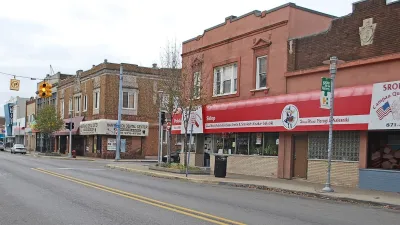Using data from the Women’s Health Initiative, a new study reveals that a walkable environment may not be enough to get people to walk more.
Keith Seinfeld discusses what Cindy Perry, a professor at the University of Washington School of Nursing, found when she compared data about the walking habits of Seattle area women with information on the walkability of their neighborhoods.
“'We did not find a clear relationship between the walkability of the neighborhood, those factors, and the women’s level of walking,' said Perry, the lead author of the study published in Health & Place....It didn’t seem to matter whether the women lived near leafy streets with interesting destinations nearby, or in a cul-de-sac far from shops and parks."
'Just having a beautiful environment isn’t going to move people from the couch to walking,' said Perry. A walkable environment can help, but it's not enough."
FULL STORY: Study: Residents of walkable areas don't always walk more

Planetizen Federal Action Tracker
A weekly monitor of how Trump’s orders and actions are impacting planners and planning in America.

Map: Where Senate Republicans Want to Sell Your Public Lands
For public land advocates, the Senate Republicans’ proposal to sell millions of acres of public land in the West is “the biggest fight of their careers.”

Restaurant Patios Were a Pandemic Win — Why Were They so Hard to Keep?
Social distancing requirements and changes in travel patterns prompted cities to pilot new uses for street and sidewalk space. Then it got complicated.

Platform Pilsner: Vancouver Transit Agency Releases... a Beer?
TransLink will receive a portion of every sale of the four-pack.

Toronto Weighs Cheaper Transit, Parking Hikes for Major Events
Special event rates would take effect during large festivals, sports games and concerts to ‘discourage driving, manage congestion and free up space for transit.”

Berlin to Consider Car-Free Zone Larger Than Manhattan
The area bound by the 22-mile Ringbahn would still allow 12 uses of a private automobile per year per person, and several other exemptions.
Urban Design for Planners 1: Software Tools
This six-course series explores essential urban design concepts using open source software and equips planners with the tools they need to participate fully in the urban design process.
Planning for Universal Design
Learn the tools for implementing Universal Design in planning regulations.
Heyer Gruel & Associates PA
JM Goldson LLC
Custer County Colorado
City of Camden Redevelopment Agency
City of Astoria
Transportation Research & Education Center (TREC) at Portland State University
Camden Redevelopment Agency
City of Claremont
Municipality of Princeton (NJ)





























